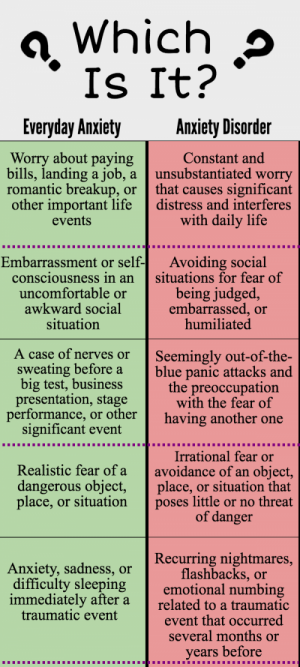If you are a company operating amidst this pandemic, what actions are you taking to reduce work anxiety for your employees? If you are working from home with additional family responsibilities how are you coping? If you are working solo, what about you?

How prevelent is anxiety in 2020?
- ADAA Anxiety and Depression Association of America reports anxiety becomes a problem when it interferes with daily activities
- The ADAA has found that “Anxiety disorders are the most common mental illness in the U.S., affecting 40 million adults in the United States age 18 and older, or 18.1% of the population every year.” ADAA reports that only about one third of individuals suffering with anxiety disorder receive treatment.
What are some common symptoms of anxiety?
- Extreme worry about your job or specific projects
- Trouble falling or staying asleep because of work worries
- Taking excessive amounts of time off
- Feeling of overwhelm at any time
- Overreacting to situations
- Constant worry you will lose your job, your loved ones
- Struggle to concentrate and focus because you feel overwhelmed with your tasks
- Focus on negative aspects of life
- Negative attitude with self, family, friends, co-workers and strangers
- Uncontrollable emotional reactions while working on projects

Anxiety takes a toll on work when we face
- Tough working environments
- Tight deadlines and more responsibilities
- Long days
- Concern about company survival
- Not feeling valued / lack of reward (low salary, no recognition, lack of benefits)
- Demanding bosses
- Personal and professional conflicts
- Anxiety about personal safety
What happens when anxiety dominates?
- Job performance declines
- Consumed with self-doubt
- Physical and mental exhaustion
- Confusion, forgetfulness and malaise
- Increase or decrease of appetite
- Isolation
Helpful Resources
This is quite a year. It’s teaching us about ourselves and those around us. There are many resources nationally, in our communities and from many individuals. To get you started, here is an initial list of resources I found online. Reaching out to those you know, like and trust for their personal recommendations is so helpful.
https://adaa.org/understanding-anxiety
https://www.nimh.nih.gov/health/education-awareness/shareable-resources-on-anxiety-disorders.shtml
https://www.counseling.org/knowledge-center/mental-health-resources/anxiety
https://www.mentalhealth.va.gov/anxiety/resources.asp

Hard to believe it’s November. Break away from the noise of the world and take care of you. A good book, a cup of something warm and moments of appreciation go a long way.
It’s time to plan for Q1 2021. When you’re ready to talk about taking care of business at home and work, contact me via Email or check out the website @ The Living Planner for additional information. Let me know if there are other ways I may be of assistance.
Stay well –Lynn
#LifeAndBusinessIntersect #CareForPeopleCareForBusiness #StepUpStepIn
